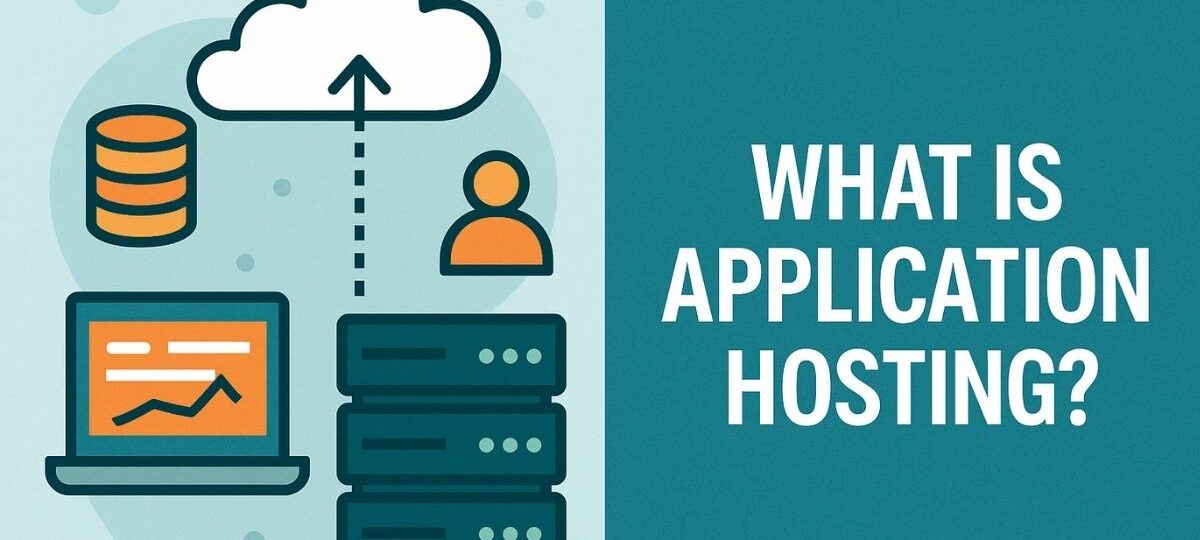What Is Application Hosting?
Application hosting refers to storing and running software applications on servers or in the cloud—making them accessible online to users around the world. Instead of running the app on your own machine, a hosting provider handles deployment, uptime, security, and scaling for you.
How Application Hosting Works
Infrastructure & Deployment Models
Application hosting often involves cloud service models like Infrastructure as a Service (IaaS), Platform as a Service (PaaS), or Software as a Service (SaaS). IaaS delivers raw compute resources, PaaS handles runtime environments and scaling logic for deploying apps, and SaaS is fully packaged applications delivered to end‑users.
Key Hosting Components
Typical components include servers (virtual or physical), databases (e.g. MySQL, NoSQL), load balancers, caching layers like Redis, security layers (firewalls, SSL), and CDN for speeding content delivery.
Types of Application Hosting
Shared Hosting
Multiple applications share resources on a single server—low cost and easy management, but limited control and performance.
VPS Hosting
Virtual Private Servers provide isolated environments with dedicated compute resources—more control than shared hosting, yet budget‑friendly. Ideal for moderate traffic and technical users.
Dedicated Hosting
A full physical server reserved for your app—maximum control and performance, higher cost. Often used for high‑traffic or regulated workloads.
Cloud Hosting
Apps hosted across multiple interconnected servers for automatic scaling, high reliability, and pay‑as‑you‑go billing. Excellent for apps with variable traffic demands.
PaaS (Platform as a Service)
Platforms like Google App Engine or Heroku abstract away infrastructure, letting developers focus exclusively on code and deployment logic. Auto scaling and built‑in libraries simplify app lifecycle management.
Backend‑as‑a‑Service (BaaS / MBaaS)
Specifically tailored for mobile or web application backends, it provides databases, authentication, APIs via provider‑managed platforms like Firebase or AWS Amplify.
Benefits of Application Hosting
Scalability
Providers manage resources dynamically—auto‑scale when traffic spikes and scale down in slow periods.
Reliability & Uptime
Cloud-based architectures use redundancy, failover, and distributed servers to keep applications online.
Cost‑Effectiveness
You pay only for actual usage. No need to invest in hardware, maintenance, or data center infrastructure.
Security & Compliance
Hosting platforms often meet industry standards and implement strong protections such as firewalls, WAF, and encryption.
Ease of Management
Vendors handle OS updates, backups, monitoring, allowing developers to focus on app logic and UI.
Hosting Architecture Overview
Front‑end & Back‑end Layer
Users connect to a front‑end layer (web servers + load balancers). Backend servers handle logic, talk to databases, queues, or caches
Caching, CDN & Load Balancers
Load balancers distribute traffic, caching layers reduce database load, and CDNs serve static content faster to users globally.
Security & Data Storage
Data storage with managed DBs (e.g. RDS), encrypted storage, VPCs, security groups, DDoS protection are all standard.
Comparison Table of Hosting Types
| Hosting Type | Cost | Control | Scalability | Best for |
|---|---|---|---|---|
| Shared | Low | Low | Limited | Blogs, small sites |
| VPS | Moderate | High | Moderate | Growing apps with tech support |
| Dedicated | High | Full | Static, high | Large traffic, compliance-heavy |
| Cloud | Pay-as-you-go | Moderate | Excellent | Variable, mission-critical apps |
| PaaS | Moderate | Abstracted | Auto-scaling | Developer-focused, rapid deployment |
| BaaS / MBaaS | Low to moderate | Minimal | Automatic | Mobile/web app backends |
Choosing the Right Hosting for Your App
Performance & Traffic Needs
Consider peak traffic, expected growth, response time requirements, and latency.
Technical Expertise & Support
Shared hosting is beginner-friendly; PaaS/BaaS simplifies infrastructure, while VPS/Dedicated require sysadmin skills.
Budget & Pricing
Shared and BaaS plans cost-effectively fit startups; cloud and PaaS scale with usage. Dedicated incurs high fixed costs.
Compliance & Data Privacy
Enterprises or regulated sectors may need dedicated or private cloud setups with audited compliance policies.
Real‑World Use Cases
SMBs & Startups
Often begin with PaaS or BaaS to minimize overhead, scale quickly, and keep costs low.
Enterprise / Regulated Industries
Require dedicated hosting or private cloud with strict SLAs, full control, and security certifications.
Mobile App Backends
Prefer BaaS/MBaaS providers like Firebase or AWS Amplify to focus on client logic over backend infrastructure.
Tips to Optimize Application Hosting
Use Caching & CDN
Implement Redis/Memcached and CDNs to offload requests and speed up response times.
Monitoring & Auto‑Scaling
Utilize tools to track metrics, set alerts, and let the system automatically scale based on demand.
Regular Security Audits
Ensure SSL/TLS, firewalls, WAF, and code scanning are in place to prevent breaches.
Common Mistakes to Avoid
- Underestimating traffic peaks or storage growth
- Choosing shared hosting for critical or growing apps
- Ignoring data backup and failover planning
- Skipping security configurations like WAF or access control
- Locking into inflexible pricing or provider lock-in
Future Trends in Application Hosting
- Serverless architecture gains traction: micro‑functions and event‑driven backends
- Edge computing & edge hosting bring apps closer to users for ultra‑low latency
- AI‑powered auto scaling and resource optimization become mainstream
- Stronger hybrid cloud & multi‑cloud strategies to avoid vendor lock-in
Conclusion
Choosing the right application hosting strategy boils down to your app’s scale, traffic patterns, technical maturity, and budget. From affordable shared or BaaS-based hosting for early projects to high-performance cloud or dedicated setups for enterprise needs—the perfect fit exists. Optimize your stack with caching, monitoring, security hardening, and stay future ready with auto-scaling and edge strategies.
FAQs

1. What is the main difference between application hosting and website hosting?
Application hosting typically runs full-featured software with backend logic and APIs, whereas website hosting may only serve static pages or simple CMS environments.
2. Is cloud hosting always better than VPS or dedicated hosting?
Not necessarily—it depends on needs. VPS offers consistent performance and control. Dedicated hosting gives full hardware access, while cloud offers flexibility but potentially variable performance based on resource sharing.
3. What is PaaS and why should I consider it?
PaaS provides a full runtime platform so developers can deploy apps without managing infrastructure. It’s ideal for faster development and simplified scaling.
4. Can I switch from shared hosting to cloud hosting later?
Yes—many providers offer migration paths. It’s a common path for growing apps moving from entry-level hosting to scalable cloud infrastructure.
5. How do I secure my hosted application?
Use SSL/TLS, enable WAF and firewalls, apply regular updates, minimize permissions, and implement authentication and encryption best practices.










